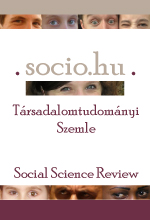Tormay Cécile: A „Nemzet Nagyasszonyának” kényelmetlen öröksége
Cecile Tormay: The uncomfortable heritage of the 'Grand Lady of the Nation'
Author(s): Anita KurimayContributor(s): Judit Takács (Editor)
Subject(s): Social Sciences
Published by: MTA TK Szociológiai Intézet
Keywords: Cécile Tormay; homosexuality; commemoration
Summary/Abstract: The study examines the motivations behind official efforts of Hungarian politicians since 1989 to rehabilitate the memory of Cécile Tormay, the internationally recognized writer and founder of the conservative interwar women’s movement in Hungary. An inherent tension existed between the public and private lives of the celebrated writer and leading proponent of the official conservative Christian nationalist views. Indeed, during the interwar years Tormay’s public life was in and of itself a „norm violation” in Hungary’s male-centered public life. In addition, Tormay never experienced the prescribed model for women of her time; marriage and motherhood. Residing only with women, Tormay also appeared as one of the homosexual protagonists in Hungary’s largest sexual scandal of the 1920s. The Rafael Zichy – Eduardina Pallavacini – Cécile Tormay triangle proved to be one of the most exciting topics in contemporary social life in Budapest, after the husband, Rafael Zichy’s filed for divorce claiming that his wife (Pallavicini) and Tormay had an „unnatural” relationship. The divorce and subsequent defamation lawsuit brought by the two women supplied fodder for Budapest’s rumor mill for years. And yet, stunningly Tormay’s star continued to rise. Until her death in 1937, Tormay was a leading member of the Hungarian Christian-conservative political and cultural elite. Neither during the interwar years nor since 1989 has Tormay’s alleged homosexuality stopped conservatives and far right politicians from embracing her as Hungary’s ideal patriotic female figure of the twentieth century. This article contends that the reason for this paradox lays in official conservative attitudes to public and private sexuality. By considering Tormay’s private sexuality to be irrelevant to her political life conservative governments between the two world wars and also during the post-socialist era have been able to identify with and utilize Tormay’s anticommunism, antisemitism, nationalism, and public support of traditional gender norms.
Journal: Socio.hu Társadalomtudományi Szemle
- Issue Year: 5/2015
- Issue No: 1
- Page Range: 5-27
- Page Count: 23
- Language: Hungarian

